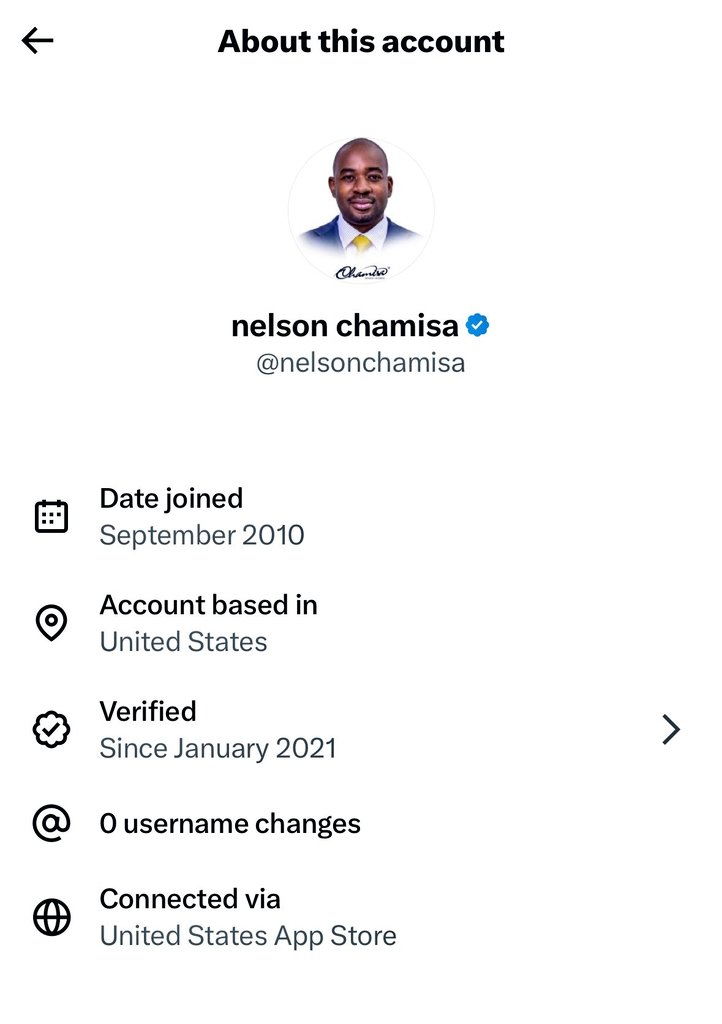HARARE – Nelson Chamisa, the former Citizens Coalition for Change (CCC) leader and long-time face of Zimbabwe’s opposition, has quietly left the country and is now living, studying, and working in the United States, multiple online indicators suggest. His relocation has ignited fierce debate at home and intensified divisions within an already fragmented opposition.
For months, rumours of Chamisa’s departure circulated across social media. Now, geo-location data generated by X (formerly Twitter) — which automatically identifies a user’s location after prolonged activity in the same place — has placed him in the United States. The development confirms what critics had long suspected: that the opposition figure had effectively exited the political arena while his supporters continued to await his next move.
Chamisa’s political trajectory has always been polarising. Critics argue that since the MDC-T era, he systematically sidelined internal rivals and weakened the opposition from within. According to them, his decisions were driven less by strategy and more by insecurity and personal preservation — often sabotaging attempts at broader opposition unity.
His campaign style, especially around the 2023 harmonised elections, has also come under renewed scrutiny. Detractors say Chamisa’s much-touted “strategic ambiguity” was less a political masterclass and more a deliberate smokescreen used to obscure financial flows, donor contributions, and opaque fundraising activities. What his supporters celebrated as creative political manoeuvring, critics interpreted as a mechanism to avoid transparency and accountability.
Chamisa raised significant funds ahead of the 2023 polls, with donations pouring in from Zimbabweans at home and across the diaspora. Opponents now argue that he has walked away from the election cycle with “tens of millions” in political contributions, settling comfortably abroad while his base remains in the dark about his long-term plans.
His departure has left a vacuum within the opposition and plunged many of his followers into uncertainty. Some have turned their hopes toward figures such as Job Sikhala and Tendai Biti, whose political interventions — often dramatic and unrestrained — continue to generate online attention.
Others have begun directing their frustrations at those who stayed behind, including former MPs Chalton Hwende and Joanna Mamombe, who defied Chamisa’s 2024 boycott directive and continued their parliamentary responsibilities.
Analysts say Chamisa’s relocation exposes deeper structural weaknesses within Zimbabwe’s opposition politics. For many ordinary citizens, the episode underscores a painful lesson: the importance of scrutinising the character, integrity, and motives of political leaders before placing blind faith in them.
Chamisa himself has remained silent on the matter, offering no public explanation for his departure, no roadmap for the future, and no indication of whether he intends to re-enter Zimbabwean politics.
What remains clear is that his exit marks a turning point. For supporters, it raises questions about the future of the opposition movement he once inspired. For critics, it provides vindication for years of warnings about a leadership style they say prioritised personal ambition over national struggle.
As Zimbabwe grapples with economic hardship, political fatigue, and dwindling democratic space, Chamisa’s departure may prove to be one of the most consequential developments of the post-2023 political landscape — a moment of reckoning for a movement now forced to redefine itself without its most recognisable figure.


